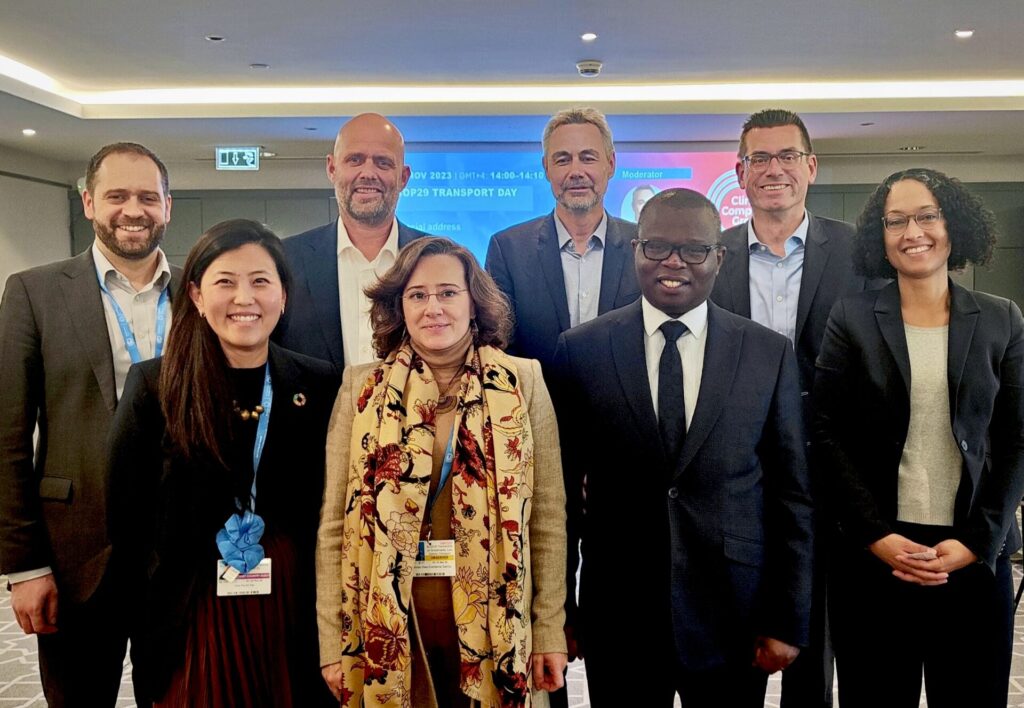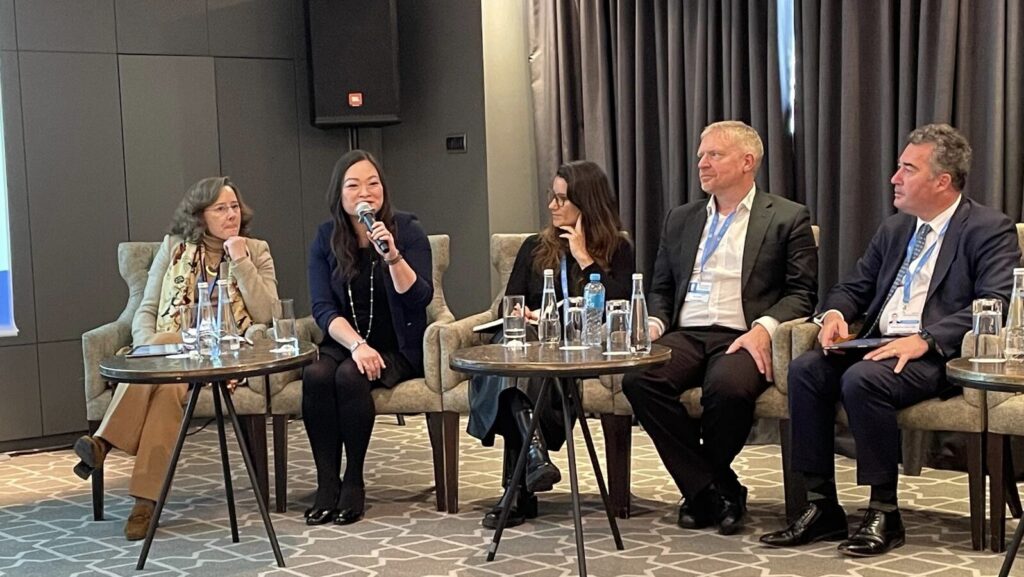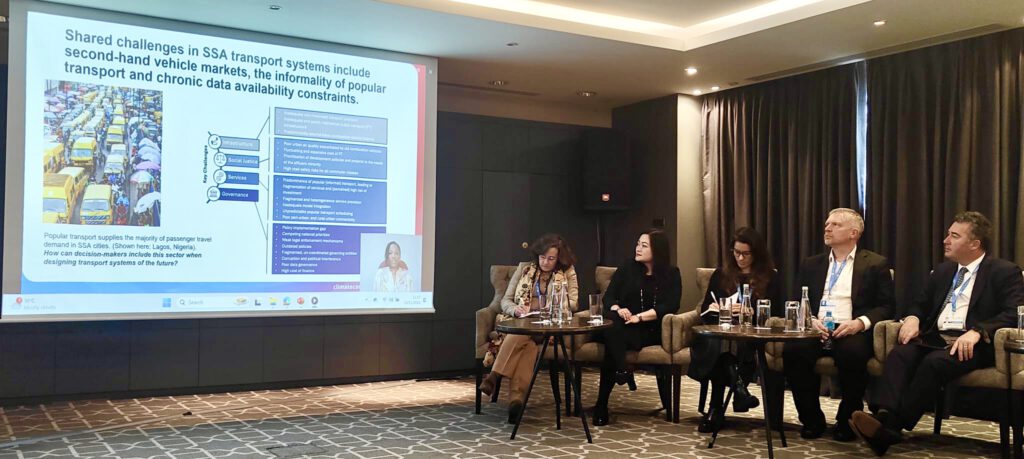Holger Dalkmann, who leads CCG’s work on Sustainable Transport, shares his reflections on COP29 and looks forward to next year in Brazil.

I attended COP (supported by CCG which is funded by FCDO) again this year, as I have done many times before. This time, for COP29 in Azerbaijan, the big theme was finance and, as we know from the media, there was a protracted and fractious negotiation session with immediate strong criticism by countries like India and Nigeria that the commitment by Higher Income Countries (HICs) was insufficient.
The negotiation sessions that take place after the public side of COP are always down to the wire and this year’s ended in the early hours of Sunday 24 November. UNFCCC Secretary, Simon Steil, commented that it was no time for victory laps as there was still a mountain of work to be done.
In terms of COP overall, I would make three main observations:
On finance, COP29 delivered in the last minute with an agreement that will: “Triple finance to developing countries, from the previous goal of USD 100 billion annually, to USD 300 billion annually by 2035 [and] secure efforts of all actors to work together to scale up finance to developing countries, from public and private sources, to the amount of USD 1.3 trillion per year by 2035.” See here for the full press release.
Despite the criticism by Least Development countries in a statement after COP, at least some of this money should be made available to move sustainable transport forward. This agreement builds on that made by the MDBs (Multilateral Development Banks) in a joint statement at the start of COP29. The eight banks plan to provide up to 120 billion USD annually to LMICs including 42 billion USD on adaptation. This will include the support for future climate action planning including sectoral plans.
Disappointingly, there was no follow-up on the UAE Consensus made at COP28 in Dubai where, for the first time last year, a commitment was made to step away from fossil energy. It’s true we didn’t go backwards, but COP missed the opportunity to get more specific by, for example, abolishing the fuel subsidy, or enacting the discussed tripling of renewable energy.
Many people had hoped that a cover text would be produced in order to provide a home for the key pledge on “transitioning away from fossil fuels” agreed at COP28. In the end, a reference to this pledge was included in a draft on the UAE dialogue – but countries failed to sign off on the document at the end of COP (see more).
More optimistically, Brazil (which will be the host country for COP30) and the UK came up with a new commitment in their NDCs. Brazil highlighted the importance of transport not only with a statement on the phasing out of fossil fuels to be replaced by biofuels and electrification, but also one on the importance of active mobility, public transport and integrated land-use planning.

What about transport?
Transport, having previously been overlooked in the earlier years of climate discussions, is now clearly recognized and a growing number of transport ministers attend COP each year. This year Transport Day was in combination with Cities Day in a common round table on green urban transport on 20 November.
The ministerial event discussed “strategies for integrating sustainable urban transport system into national, regional and city planning structures.” It was stressed that there is a need to promote closer collaboration between stakeholders and governments to accelerate the decarbonization of urban transport. (see more)
Many ministers acknowledged the importance of walking and cycling (which are very low-cost options to support financially) and public transport. Several gave specific examples including Chile’s Transport Minister Juan Carlos Munoz, who highlighted on several occasions the importance of balancing EV solutions and options to reduce transport through better planning and strengthening walking, cycling and public transport particularly in LMICs.
He also supported the new 2030 Breakthrough agenda on Avoid and Shift, which was endorsed by over 100 organisations, including CCG. This aims to “double the share of energy efficient and fossil-free forms of land transport for people and goods by 2030, by focusing on shifts to public transport, walking, cycling and rail freight, as well as electric vehicles and railways.” (See more) The Avoid and Shift pledge builds on SLOCAT’s call from last year to double the share of energy efficient and fossil-free forms of land transport by 2030. (See more)
One focus of the Sustainable Transport community is to raise the ambitions of NDCs (Nationally Defined Contributions) as they have, in some cases, struggled to be effective and could achieve more. To achieve those efforts several NDC guidance documents on walking and cycling, popular transport, public transport, and rail were released together with an overarching guidance by the International Transport Forum (ITF).
All of these documents were discussed and presented at the 4th CCG Transport Day in partnership with the ADB, GIZ, the FCDO funded High-Volume Transport Programme and SLOCAT on 18 November. Jamie Leather of the Asian Development Bank (ADB) presented on trends within Asia based on the latest Asian Transport Outlook report, which highlighted the need for more ambitious targets and action. UNESCAP in partnership with SLOCAT, HVT, ATO and ADB produced a Policy Brief on NDCs in Asia highlighting the need to ensure that all transport policies are recognized in future NDCs. These complemented the ongoing activities by the Zero Emissions Vehicle Alliance , which was launched at COP26 in Glasgow, which recognized the need for a different approach to electrification (for Zero Emission Vehicles) for emerging markets in the launched ZEVTC roadmap.

All this knowledge can be applied with an official UNFCCC deadline for February 2025. Though it became clear, that many countries will take more time before their submission is ready for COP30 in Belem, Brazil.
Furthermore, in several events a stronger emphasis on popular transport as well as a focus on workers’ rights (during the Marrakesh partnership event) became more visible. Justice and fairness, as also presented in the Hamburg Charter on Just Mobility presented by GIZ, need to be key aspects of the future transport transition.
While the need for capacity-building for more sustainable transport was acknowledged and some city events (such as the Netherlands) showcased their commitment to support cycling in LMICS (launched at COP28 in Dubai), there are still substantial gaps. For example, Malindi Msoni, ZIPAR, as part of a group of African researchers, called for action on better data and modelling for Africa at the CCG Transport event. Without better data and modelling a country cannot create a firm foundation for its clean energy and sustainable transport policies or plans. This point was elaborated on with an overview by Mark Howells on the Data-to-Deal framework which helps to streamline the process towards climate finance for transport, as detailed in the latest CCG COP policy brief.
What can we hope for from COP30?
It’s been said many times before, but time is running out. Global governments need to raise ambition in the transport sector through sectoral targets and further strengthening climate finance as the Minister for Infrastructure from Burundi – Hon Dieudonne Dalkane – highlighted in his statements
The tools and information to address climate challenges are already there but they need to be implemented urgently with more support from High Income Countries. Building capacity at short notice, particularly in LMICs, is crucial.
It was great to see Transport Ministers joining COP29, but now common commitments on progressing to phase out fossil fuel, phasing out fuel subsidies and setting clear transport targets aligned with a clear pathway for more climate finance, are needed to get on a decarbonization pathway. The so-called non state actors, partially organized in the Marrakesh partnership, showed that there is the will to collaborate with government.
With the preparation for the UN Decade on Sustainable Transport starting in 2026 and the COP30 in Brazil, opportunities lies ahead to scale the just decarbonization agenda in the coming year.
